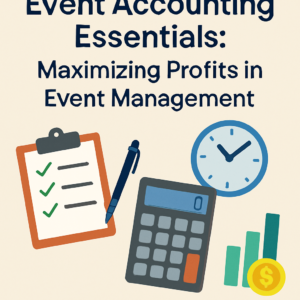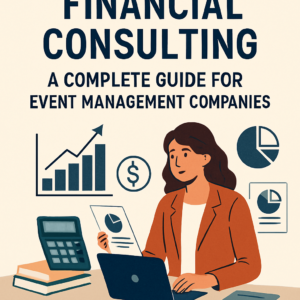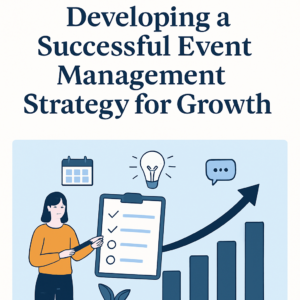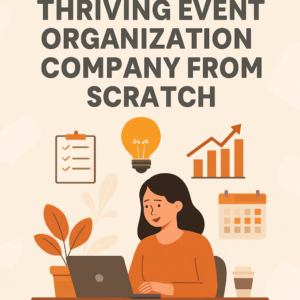7 Event Planning Strategies That Will Double Your Revenue
Introduction
Welcome to the world of event planning strategy, where creativity meets logistics, and every detail counts! If you’re a corporate event manager looking to boost your revenue, you’ve landed in the right spot. In this digital age, successful event planning requires more than just a great venue and a fancy guest list; it demands innovative thinking and strategic execution.
Think of your next event as a blockbuster movie. You need a compelling script (that’s your strategy), a talented cast (your team), and an audience that’s ready to be wowed (your attendees). The right event planning tips can turn a good event into an unforgettable experience that not only engages but also drives revenue.
In this post, we’ll dive into seven powerful strategies that will not only elevate your events but could potentially double your revenue. From enhancing audience engagement strategies to mastering the art of budget-friendly event planning, these insights are designed for corporate event planners who want to make their mark. Ready to roll? Let’s get started!

Understanding the Importance of an Effective Event Planning Strategy
Picture this: you’re hosting a corporate gala, and everything seems to be in place. The venue is gorgeous, the catering is top-notch, and the entertainment is lively. But wait! Attendees are wandering around aimlessly, food is running out, and your carefully crafted schedule has gone out the window. Sounds like a nightmare, right? This is why an effective event planning strategy is crucial.
An event planning strategy isn’t just a checklist; it’s your roadmap to success. It ensures every detail aligns with your goals and helps avoid those “oops” moments that can derail even the most well-intentioned events. Here’s why having a solid strategy can make or break your next gathering:
- Clarity of Purpose: A well-defined strategy helps clarify what you want to achieve be it networking opportunities, brand exposure, or lead generation.
- Efficient Resource Allocation: Knowing your objectives allows for smarter budgeting and resource management. You won’t waste money on unnecessary swag if you know exactly what your audience values.
- Enhanced Attendee Experience: A strategic approach means considering every aspect of attendee experience from registration to post-event follow-up ensuring they leave with a smile (and maybe even a new client).
- Risk Management: An effective event management strategy includes contingency plans for potential hiccups. Think of it as having an umbrella on a cloudy day you might not need it, but you’ll be glad it’s there!
Did You Know? According to recent studies, events with a clear strategic plan see up to 30% higher engagement rates compared to those without one.
A successful event planning strategy also involves innovative approaches like hybrid event strategies that blend in-person and virtual experiences. This not only broadens your audience but also enhances engagement through interactive elements in events planning.
If you’re still thinking that event planning is just about booking venues and sending invites, think again! It’s about crafting memorable experiences that resonate with attendees long after the last dance has ended. So buckle up because an effective event planning strategy is your ticket to doubling that revenue!
1. Leverage Data-Driven Decision Making
In the world of event planning, data is your best friend. Think of it as the GPS guiding you through the winding roads of corporate event planning. Without it, you might just end up lost in a sea of guesswork and hope!
Data-driven decision making is all about using concrete evidence to shape your event planning strategy. Here’s how to do it:
-
Analyze Past Event Performance
Dive into the numbers from your previous events. What worked? What flopped? Look at attendance rates, feedback scores, and revenue generated. This isn’t just number crunching; it’s like reading the tea leaves of your event history!
-
Utilize Attendee Feedback for Improvements
Your attendees are a goldmine of insights. Send out surveys post-event and encourage honest feedback. Did they love the venue? Was the food a hit or a miss? Use this data to refine future events after all, nothing says “I care” like listening to your audience!
Key Insight: According to a recent survey, events that utilized attendee feedback saw a 30% increase in satisfaction ratings for their next event!
But wait, there’s more! Don’t just stop at analyzing past performance or gathering feedback. Consider incorporating advanced analytics tools into your arsenal. Platforms that offer insights on attendee behavior can help you tailor experiences that resonate with your audience.
“Using data not only helps in improving attendee experience but also enhances ROI measurement in events.”
Incorporating an effective event management strategy based on solid data can transform how you approach everything from venue selection to marketing tactics. So roll up those sleeves and get ready to dive deep into the numbers your future self (and your bank account) will thank you!

2. Create a Comprehensive Event Marketing Strategy
Alright, let’s dive into the nitty-gritty of crafting an event marketing strategy that not only gets people talking but also fills those seats faster than a flash sale on Black Friday!
First off, think of your event as a blockbuster movie. You wouldn’t just drop it without a trailer, right? The same goes for your event! Here are some killer strategies to ensure your event is the talk of the town:
- Utilize Social Media for Events: Leverage platforms like Instagram and LinkedIn to create buzz. Share sneak peeks, behind-the-scenes content, or even countdowns to build anticipation. Remember, every post is a chance to engage your audience and keep them excited!
- Implement Email Marketing Campaigns: Send out targeted emails that feel personal rather than promotional. Use catchy subject lines and engaging content that makes recipients feel like they’re missing out if they don’t attend.
- Innovative Event Promotion Tactics: Think outside the box! Consider creating an interactive online campaign where potential attendees can vote on themes or speakers. This not only engages them but also makes them feel invested in the event.
- Sustainable Event Planning: More attendees are looking for eco-friendly options today. Highlight your sustainable practices in marketing materials to attract this audience segment.
But wait, there’s more! Don’t forget about post-event marketing. A successful event doesn’t end when the lights go down. Keep the momentum going with:
- Post-Event Evaluation Methods: Send out surveys asking for feedback on what attendees loved and what could be improved. Use this data for future planning.
- Engaging Content Sharing: Share highlights from the event photos, videos, testimonials to keep the conversation alive and encourage attendance at your next gathering.
Tip: Create a hashtag for your event! This not only helps in tracking engagement but also builds community around your brand.
Your comprehensive event marketing strategy should be as dynamic as your events themselves! By integrating these techniques with effective event coordination techniques and strategic meeting management principles, you’ll not only attract attendees but also enhance their overall experience leading to higher revenue!
3. Optimize Venue Selection and Logistics Management
Choosing the right venue is like picking the perfect pair of shoes for a first date get it wrong, and you’ll be uncomfortable all night! The venue sets the stage (literally) for your event and can make or break the overall experience. So, let’s dive into some venue selection tips that’ll have your guests raving about their time long after they’ve left.
Accessibility and Capacity Needs
First things first: consider accessibility. Is your venue easy to get to? Are there ramps for those who need them? Think about parking options too nobody wants to arrive at an event only to circle the block like a vulture looking for a spot.
Next up, capacity. You don’t want your event feeling as cramped as a can of sardines nor do you want it echoing like an empty hall. Aim for a venue that comfortably accommodates your expected number of attendees without making it feel like a cozy gathering or an awkwardly large affair.
Effective Event Logistics Management
Now that you’ve got your venue locked down, let’s talk logistics management because what’s an event without some smooth sailing? Here are some key aspects to keep in mind:
- Timeline for Event Planning: Create a detailed timeline that outlines every step leading up to the big day. This will help keep everyone on track and avoid last-minute chaos.
- Sustainable Event Planning: Consider eco-friendly options, from catering to decor. Not only will this appeal to environmentally conscious attendees, but it can also save costs in the long run!
- Crisis Management During Events: Always have a contingency plan. Whether it’s bad weather or tech issues, being prepared means you won’t have to scramble when things go sideways.
- Vendor Negotiation Techniques for Events: Don’t just accept the first quote you receive! Negotiate with vendors to ensure you’re getting the best deal possible while maintaining quality service.
Takeaway: The right venue paired with solid logistics management can enhance attendee experience significantly, ensuring that your event is not just successful but memorable!

4. Enhance Attendee Experience Through Innovative Concepts
When it comes to event planning strategy, the attendee experience is the secret sauce that can turn a good event into a great one. Think of it as the cherry on top of your event sundae without it, you’re just serving vanilla ice cream! So, how do you make your attendees feel like they’re part of something special? Let’s dive into some innovative concepts that can elevate their experience and keep them talking long after the event ends.
Create Engaging and Interactive Elements
Remember when events were just a series of speakers droning on about their latest projects? Yawn! Today’s audiences crave interaction. Incorporating interactive elements is key to keeping everyone engaged. Here are some ideas:
- Live Polling: Use apps like Slido or Mentimeter to get real-time feedback from attendees during sessions.
- Workshops: Instead of traditional presentations, offer hands-on workshops where participants can learn and apply new skills.
- Gamification: Turn networking into a game! Create challenges or scavenger hunts that encourage attendees to mingle and collaborate.
Focus on Audience Engagement Strategies
Your audience is not just there to listen; they want to be part of the conversation. Here are some audience engagement strategies that can transform passive listeners into active participants:
- Q&A Sessions: Allow ample time for questions after presentations, or better yet, integrate Q&A throughout the session.
- Networking Opportunities: Designate specific times and spaces for networking think lounges with comfy seating or themed breakout areas.
- Sustainable Event Planning: Show your commitment to sustainability by incorporating eco-friendly practices. Attendees love feeling good about their choices!
Pro Tip: Always gather feedback through post-event evaluation methods! This will help you refine your innovative event strategies for future events.
The Power of Theme Development
A well-thought-out theme can tie everything together and create a cohesive experience. Whether it’s a corporate gala or a wedding planning strategy, themes should resonate with your audience’s interests and values. For example, if you’re hosting an experiential marketing event focused on tech innovations, consider a futuristic theme with interactive displays showcasing cutting-edge products.
The key takeaway here is simple: enhancing the attendee experience isn’t just about flashy decorations; it’s about creating memorable interactions that leave participants buzzing with excitement. By implementing these innovative concepts in your next event planning strategy, you’ll not only boost engagement but also increase the likelihood of repeat attendance cha-ching!
5. Implement Budget-Friendly Event Planning Techniques
When it comes to event planning strategies, a tight budget can feel like a ball and chain. But fear not! With the right event coordination techniques, you can stretch those dollars further than a yoga instructor at a flexibility workshop.
Get Creative with Sponsorship Strategies
Sponsorships are like the fairy godmother of event planning turning pumpkins into carriages and making your budget woes disappear. Here’s how to make them work for you:
- Identify potential sponsors who align with your event’s theme. Think of brands that would benefit from exposure to your audience.
- Create sponsorship packages that offer tiered benefits, from logo placement to speaking opportunities. Make it enticing!
- Leverage social media for events by showcasing sponsors in your promotional materials. Everyone loves a shout-out!
Master Vendor Negotiation Techniques
Negotiating with vendors can feel like trying to win a game of poker against seasoned pros, but fear not! Here are some tips to up your game:
- Always ask for discounts or package deals vendors often have wiggle room in their pricing.
- Build relationships with vendors over time, which can lead to better rates and services in the future.
- Consider barter arrangements; if you can offer something in return, vendors may be more willing to negotiate.
Key Takeaway: Implementing budget-friendly event planning techniques doesn’t just save money it can enhance your overall event experience by allowing more creativity and innovation.
Avoid Common Misconceptions
A common misconception is that budget-friendly means low-quality. Not true! With strategic event planning, you can create memorable experiences without breaking the bank. Focus on:
- Creative event concepts: Think outside the box host events in unique venues or incorporate local culture.
- Sustainable event planning: Eco-friendly practices often reduce costs while appealing to environmentally conscious attendees.
- Digital tools for event planners: Use technology for virtual events or hybrid formats that reach wider audiences at lower costs.

6. Foster Networking Opportunities and Team Building Events Strategy
In the grand tapestry of event planning strategies, weaving in networking opportunities and team-building events is like adding the perfect seasoning to a gourmet dish. It not only enhances the flavor but also leaves a lasting impression on your attendees!
Let’s face it: people attend events not just for the content but for the connections. Think of your event as a giant, professional matchmaking service where the goal is to create meaningful connections that can blossom into fruitful collaborations.
Create Spaces for Networking During Events
Designing your event layout with networking in mind is crucial. Consider these creative ideas:
- Chill Zones: Set up comfortable lounge areas where attendees can kick back, grab a coffee, and strike up conversations.
- Speed Networking: Organize quick meet-and-greet sessions that allow participants to connect with multiple people in short bursts like speed dating but with less awkwardness!
- Themed Breakout Sessions: Host small group discussions around specific topics where attendees can share insights and forge connections.
Incorporate Team-Building Activities into the Agenda
No one wants to sit through another boring lecture! Spice things up by integrating team-building activities that promote collaboration and fun. Here are some effective event coordination techniques:
- Interactive Workshops: Engage participants in hands-on activities that require teamwork think escape rooms or creative brainstorming sessions.
- Friendly Competitions: Organize contests or challenges that encourage teamwork while adding an element of excitement. Who doesn’t love a little friendly rivalry?
- Sustainable Practices: Incorporate eco-friendly initiatives during team-building exercises, such as community service projects or green challenges, which not only build camaraderie but also highlight your commitment to sustainability.
The goal here is clear: create an environment where attendees feel comfortable engaging with each other, leading to valuable relationships that extend beyond your event.
By fostering these networking opportunities and implementing a solid team building events strategy, you’re not just planning an event you’re creating an experience that resonates long after the final applause. Remember, successful event planning isn’t just about logistics; it’s about building connections that can drive future success!
7. Measure Success with ROI Measurement in Events and Post-Event Evaluations
Alright, let’s talk about the secret sauce to ensuring your event planning strategy doesn’t just look good on paper but actually pays off in real life ROI measurement! If you’re not measuring your return on investment (ROI), it’s like throwing a party and not counting how many people showed up. Spoiler alert: that’s a recipe for disappointment.
First things first, what is ROI in the context of events? It’s the magic number that tells you whether your investment in event planning was worth it. Think of it as the scorecard for your event planning strategy, giving you insights into what worked and what didn’t.
Implementing Post-Event Evaluation Methods
After the confetti has settled and the last slice of cake has been devoured, it’s time to roll up your sleeves and dive into post-event evaluations. This is where you gather all those juicy insights that can help you tweak your future events. Here are some effective evaluation methods:
- Surveys: Send out post-event surveys to attendees. Ask them about their experience, what they loved, and what could use some sprucing up.
- Data Analysis: Analyze registration numbers, attendance rates, and engagement metrics. Did people stick around for the whole thing or sneak out early?
- Feedback from Staff: Your team is on the front lines! Gather their thoughts on logistics management, attendee interactions, and any hiccups that occurred.
The ROI Calculation
Now that you’ve got all this data, it’s time to crunch some numbers! Here’s a simple formula to calculate ROI for your events:
| Description | Formula |
|---|---|
| Total Revenue Generated | (Total Income from Event) |
| Total Costs Incurred | (Venue + Catering + Marketing + Staff) |
| ROI | ((Total Revenue – Total Costs) / Total Costs) x 100% |
This formula gives you a percentage that represents how much profit you’re making relative to costs. A positive number means you’re in the green yay! A negative number? Time to reassess those event coordination techniques.
Avoiding Common Pitfalls
A common misconception is thinking that high attendance equals high ROI. Not necessarily! You could have a packed house but if they’re not engaged or spending money, then you might be missing out on real success. Focus on attendee experience enhancement alongside those headcounts!
In conclusion, measuring success through effective ROI measurement isn’t just a nice-to-have; it’s essential for refining your strategic event planning approach. By implementing solid post-event evaluation methods and understanding how to calculate ROI accurately, you’re setting yourself up for future success in corporate event planning!
Conclusion: The Path to Doubling Your Revenue Through Strategic Event Planning
- Recap of key strategies discussed
- Encouragement to implement these strategies in upcoming events









